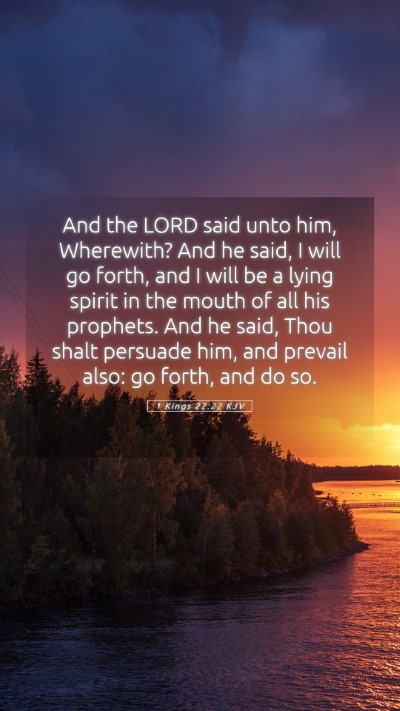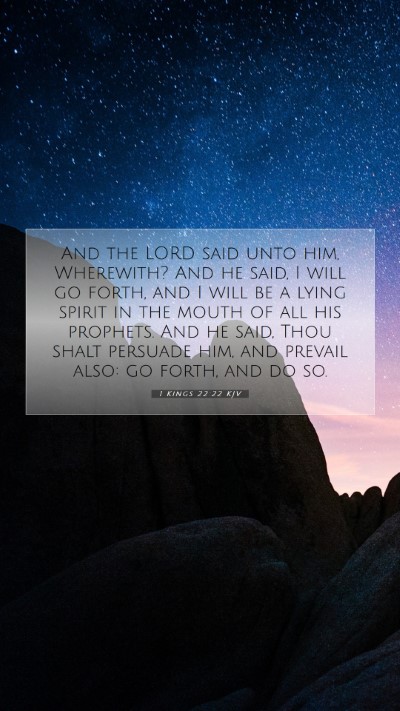Bible Verse Commentary on 1 Kings 22:22
This passage reflects on an intriguing moment where God allows a lying spirit to influence the prophets of King Ahab, ultimately leading him to his doom. Understanding this verse requires delving into themes of divine sovereignty, human choice, and the consequences of turning away from truth.
Verse Overview
1 Kings 22:22 states, "And the Lord said unto him, How then dost thou go? And he said, I will go forth, and I will be a lying spirit in the mouth of all his prophets. And he said, Thou shalt persuade him, and prevail also: go forth, and do so."
Insights from Public Domain Commentaries
-
Matthew Henry's Commentary
Matthew Henry illustrates that the divine council in heaven deliberates on how to elicit Ahab's downfall, showcasing God's omnipotence in using even deceit to achieve His purposes. He explains that God's permission of falsehood highlights the danger of rejecting divine truth, as Ahab had done by ignoring genuine prophetic guidance.
-
Albert Barnes' Notes
Barnes emphasizes that this event serves to show the willingness of God to use a lying spirit as a means to fulfill His judgment. He notes that this reflects the truth regarding the nature of prophecy in Israel during Ahab's reign, where many prophets were more concerned about flattering the king than delivering God's pure message. The moral implications underscore the risk of surrounding oneself with deceptive influences.
-
Adam Clarke's Commentary
Clarke provides a detailed analysis of the mechanisms of divine prophecy, asserting that the spirit's lying serves a greater purpose ordained by God. He discusses the theological implications, suggesting that God allows a form of judicial blindness to those who persist in rebellion against Him. Clarke’s insights call attention to the process of divine judgment where human unfaithfulness invites spirits of deception.
Key Themes
-
Divine Sovereignty:
The passage reveals God's ultimate control over all events, including the moral choices of His creatures. Ahab's refusal to heed the warnings makes him susceptible to deception.
-
The Nature of Prophecy:
This verse illustrates a significant shift in the nature of prophetic voices in Israel, emphasizing a departure from true prophecy towards manipulation and falsehood.
-
Consequences of Rejection:
Ahab's choice to reject God’s true prophets sets the stage for his tragic end. The manipulation by the lying spirit is a direct result of Ahab's persistent disobedience.
-
Judicial Blindness:
The divine allowance for a lying spirit underlines a theological concept that God sometimes permits fallacies to mislead those who willingly turn from the truth.
Practical Applications
Believers and study groups can derive several applications from this passage:
- Vigilance: Be discerning about the messages and teachings encountered, always comparing them against Scripture.
- Accountability: Recognize the crucial nature of godly counsel and the dangers of surrounding oneself with friends or advisors who may not uphold biblical truths.
- Spiritual Preparedness: Maintain a life of prayer and study to ensure clarity and wisdom in understanding divine guidance versus deception.
Cross References
- 2 Chronicles 18:21: Similar account of a lying spirit sent to persuade Ahab.
- Romans 1:24: God's judgment leading people to dishonor their bodies and fall into sin.
- Matthew 7:15: The warning against false prophets who appear as sheep but inwardly are wolves.
Conclusion
1 Kings 22:22 serves as a powerful reminder of the importance of seeking God's truth over earthly wisdom. Through careful study and reflection, readers can draw meaningful insights that deepen their understanding of God's nature and their own spiritual journey. This illustration of divine judgment through deception invites a thorough examination of one’s life choices and the voices we allow to influence us.


